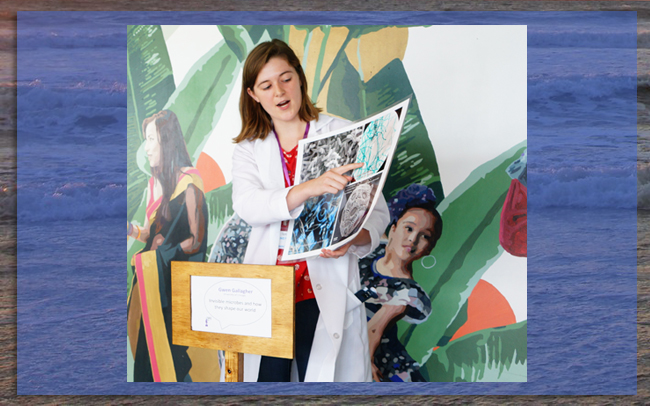
Gwen Gallager conducts an outreach event in Chicago, giving a presentation called “Invisible microbes and how they shape our world.” She’s showing pictures of environmentally relevant microbes. Credit: @SoapboxSciChi
— By Chris Gonzales, Freelance Science Writer, New York Sea Grant
Contacts:
Paul C. Focazio, Communications Manager, New York Sea Grant, E: Paul.Focazio@stonybrook.edu, P: 631-632-6910
Kathy Bunting-Howarth, NYSG's Associate Director, E: keb264@cornell.edu, P: 607-255-2832
Stony Brook, NY, April 5, 2022 - Gwen Gallagher has been named the coastal climate specialist for New York Sea Grant. In this new position, which is based at Stony Brook University, Gallagher will conduct outreach related to offshore renewable energy development and the blue economy. In addition, she will develop programming related to climate change and its impacts on coastal ecology and communities, covering topics like ocean acidification and carbon sequestration.
Offshore wind makes the short list of key renewable energy technologies. In New York State with its more than 2,000 miles of coastline, it’s poised for growth, promising a potential steady source of renewable energy. Driven by the state’s climate goals, multiple projects are under development now, with the aim to harness 9,000 MW of offshore wind energy by 2035.1
Gallagher has a Ph.D. in geophysical sciences from the University of Chicago. In her new role, she will focus on creating objective outreach materials about offshore wind and renewable energy and disseminating them to engage stakeholders in New York coastal communities. She will also conduct extension (providing education for those not currently attending university) for a Northeast Regional Sea Grant Network Offshore Renewable Energy (ORE) research project. The purpose of the research will be to better understand the effects of offshore wind energy on coastal communities.
Funding for the competitive process to select the ORE project was provided by the U.S. Department of Energy Wind Energy and Water Power Technologies Office, National Oceanic and Atmospheric Administration, and Northeast Fisheries Science Center.
“I’m really excited to join the New York Sea Grant team and extend offshore wind-related research to our stakeholders,” said Gallagher. “Public engagement and outreach have been the most rewarding aspects of my career so far, and I’m eager to continue this work by making marine and climate science more accessible to all community members.”
In addition to her Ph.D. from Chicago, Gallagher completed her undergraduate degree in biochemistry from Barnard College, Columbia University, in New York City. She brings expertise in ocean sciences, marine microbiology, and carbon cycle biogeochemistry. She also has experience in leadership, community involvement, and science writing for general audiences.
"I’m thrilled to welcome Gwen to our team,” said Kathy Bunting-Howarth, associate director of New York Sea Grant. “In addition to offshore energy work, she will extend cutting-edge research related to climate-change mitigation. How can our seagrasses and seaweeds be used for carbon sequestration? How can multiple environmental goals—such as increased water quality, habitat enhancement, and carbon storage—be met? Ultimately, the translation of this research to our community members will help with local resilience and ocean literacy.”
This new position is being established even as New York State is already feeling the effects of climate-change impacts, from sea level rise and nuisance coastal flooding, more frequent rainfall, scouring of roads and bridges from heavy runoff, and severe coastal storms such as Hurricane Ida in late summer of 2021.
References
1 NYS: Offshore Wind
More Info: New York Sea Grant
New York Sea Grant (NYSG), a cooperative program of Cornell University
and the State University of New York (SUNY), is one of 34 university-based
programs under the National Oceanic and Atmospheric Administration’s
National Sea Grant College Program.
Since 1971, NYSG has represented a statewide network of integrated
research, education and extension services promoting coastal community
economic vitality, environmental sustainability and citizen awareness
and understanding about the State’s marine and Great Lakes resources.
Through NYSG’s efforts, the combined talents of university scientists
and extension specialists help develop and transfer science-based
information to many coastal user groups—businesses and industries,
federal, state and local government decision-makers and agency managers,
educators, the media and the interested public.
The program maintains Great Lakes offices at Cornell University, University at Buffalo, SUNY Oswego and the Wayne County Cooperative Extension office in Newark. In the State's marine waters, NYSG has offices at Stony Brook University and Cornell Cooperative Extension of Nassau County on Long Island; at Brooklyn College, with New York City Department of Environmental Protection in Queens and at Cornell Cooperative Extension in NYC and Elmsford and Kingston in the Hudson Valley.
For updates on Sea Grant activities: www.nyseagrant.org has RSS, Facebook, Twitter, Instagram, and YouTube links. NYSG offers a free e-list sign up via www.nyseagrant.org/nycoastlines for its flagship publication, NY Coastlines/Currents, which is published quarterly.